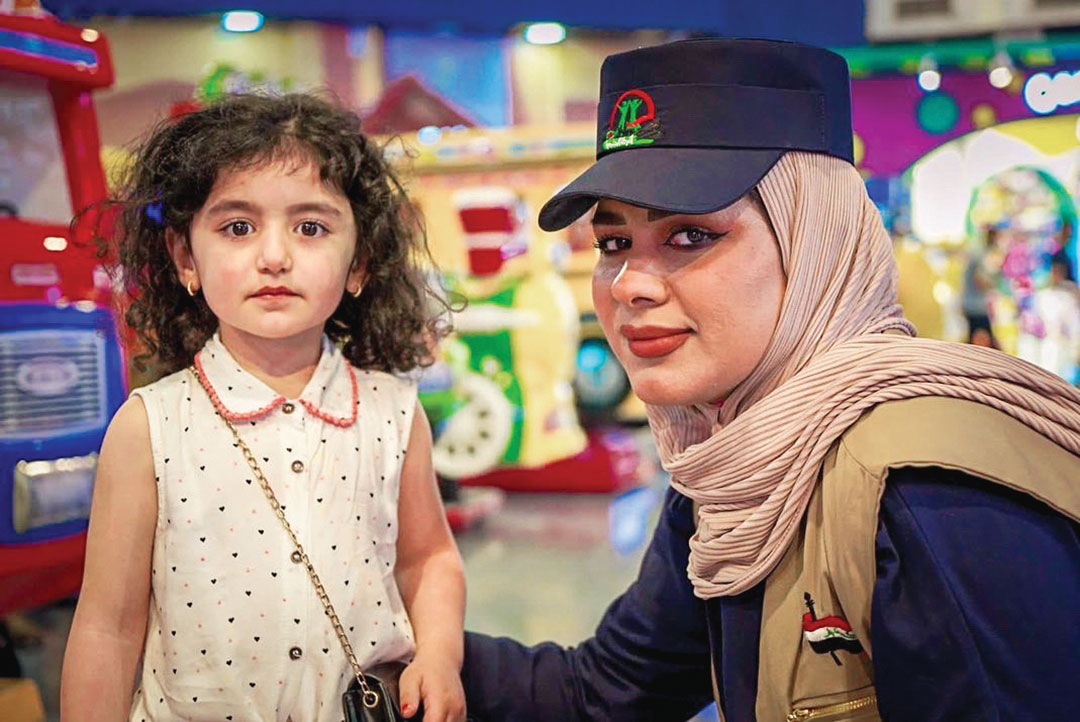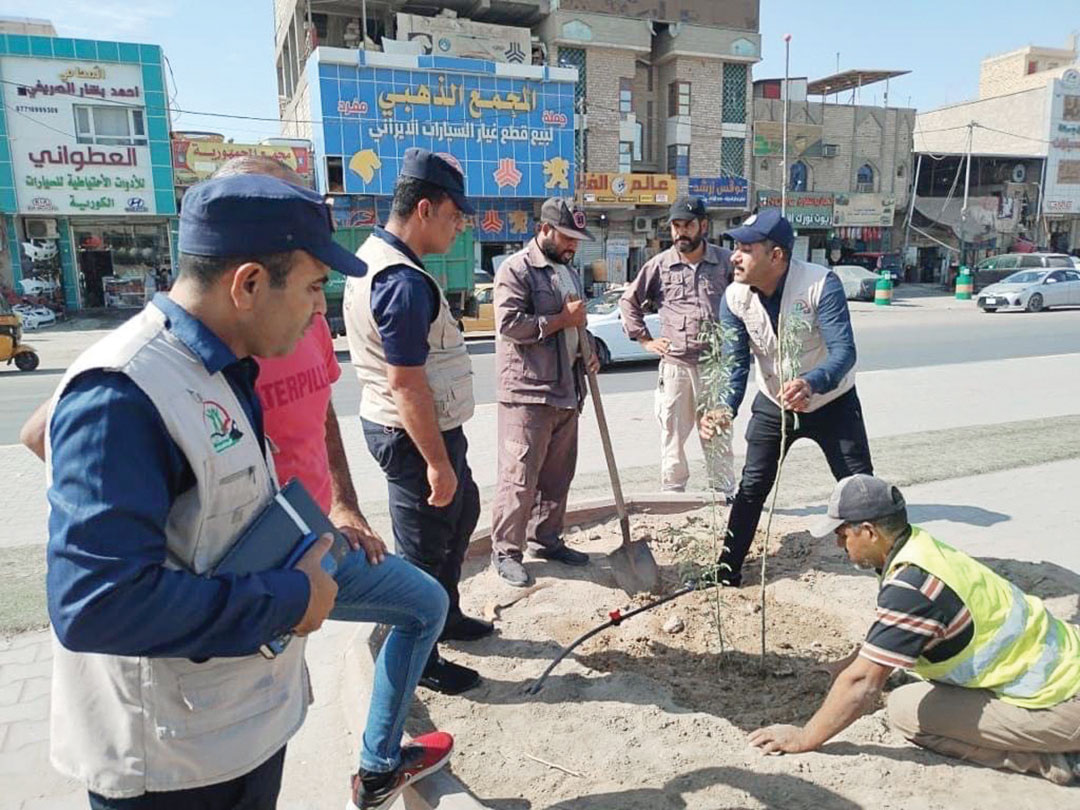Building Peace Through Better Policing
Iraq’s community policing program racks up successes countering terrorism and crime
UNIPATH STAFF
Iraq’s community policing program has demonstrated great success in prosecuting criminals, countering rumors, immunizing young people against the dangers of extremism and terrorism, and rehabilitating victims of drug addiction. Community police connect with citizens in their homes, in educational and health institutions, and in other state institutions to address issues at the ground level. Unipath met with Maj. Gen. Dr. Saad Maan, security advisor for the Iraqi Ministry of Interior (MOI), to discuss the role of community police.
Unipath: What differentiates community police from local police?
Maj. Gen. Saad: Community Police are a security organization within the MOI meant to strengthen relations between the security establishment and the community by way of community police members’ intervention in issues that threaten civil peace in the country. These interventions can take many forms, which are based on providing advice, advocacy and education, as well as promoting cooperation among members of society to preempt crimes and mistakes. Local police work is based on preliminary investigations and the execution of arrest warrants issued by judicial authorities in addition to the many other tasks. The similarity between the two, however, lies in everyone’s concern for the rule of law and boosting societal stability.
Unipath: How many members and sections does the Community Police Department have?
Maj. Gen. Saad: Staffing exceeds 1,000 men and women and includes officers of all ranks and civil servants distributed throughout the various governorates of the country. The Community Police Department includes 24 divisions, including 16 divisions in Baghdad and the provinces, and six specialized technical divisions, the administration division, and the monitoring division.
Unipath: What accounts for the success of community policing in Iraq?
Maj. Gen. Saad: The reason for the success of the Community Police in Iraq is officers’ closeness to the community and its activities. Community Police are different from other formations in its relative simplicity: providing advice, counseling, advocacy and education without the rough touch of some traditional policing methods. Additionally, success can be attributed to the attention of the Ministry of Interior embodied by the Minister of Interior himself and his continuous and great support for community policing, providing both technical and logistical support. These are important factors in the success of community policing, which is also supported by the United Nations because of the humanitarian nature of its work.
 Unipath: Could you describe the duties of these officers in more detail?
Unipath: Could you describe the duties of these officers in more detail?
Maj. Gen. Saad: The work of the Community Police cannot be summarized in a few short lines but we can speak generally about the most important tasks entrusted to it, namely, its devotion to strengthening the partnership between the security establishment in the Ministry of the Interior and the community with its individuals, organizations, and all its details based on a common desire to improve security and stability and to fight crime in all its forms. The Ministry of the Interior believes that security and stability cannot be achieved in any part of the world, let alone Iraq, without the concerted efforts of its people and their great support for the work of security institutions.
From this standpoint, the Community Police mandate is multifaceted. It includes strengthening family bonds and combating crimes that threaten its structure, such as cybercrime and extortion, and combating unhealthy customs and traditions for fear they might spread in society. This is in addition to supporting all police institutions by combating crimes before they take place through advocacy, education, advice and counseling, and engaging all citizens in activities, events and constructive communication, and attending religious events for all religions.
Community Police are also responsible for another important function, ensuring the rehabilitation of members of Iraqi society subject to addiction, displacement or abuse, gradually reintegrating them into society. Community Police undertake visits to schools and universities and give talks on public safety and the dangers of falling victim to criminals, as well as carrying out many other tasks and functions.
Unipath: Why do the Community Police focus on social media outreach?
Maj. Gen. Saad: To keep up with technological advancements and the ease with which various segments of society and age groups have come to acquire, use, and rely on smart devices and social networking sites, Community Police have developed a number of channels for communicating with the public on platforms like Facebook, Instagram and YouTube. Content includes news updates, outreach, interactive posts, and communication via messaging apps as well as live stream programs that include educational segments about negative phenomena, societal problems, and recurring crimes, without losing sight of its role in the field, which is the crux of its work.
Unipath: How do the Community Police prosecute perpetrators of cybercrime?
Maj. Gen. Saad: The most prominent cybercrime monitored by the community police is cyber extortion. The Community Police “497” hotline receives daily calls in this regard, and more than a thousand calls during the past year were dealt with. The Community Police has taken upon itself to address this in two ways: First, we respond to the appeals of those citizens subjected to blackmail. For those who want to avoid judicial proceedings, provided that the blackmailer is known to them (his address or place of work along with any details that can be obtained), community police will go to his residence and speak to him using the force of law, destroy the blackmailing tool, and get a written pledge that he will not repeat the act. Second, in cases where the blackmailer has no known address or place of work, we direct victims to the competent authorities for further help.

Unipath: What is the role of the Community Police in combating drugs?
Maj. Gen. Saad: There is no doubt that the threat of drugs is no different than the threat of terrorism, both of which work to destroy society. Drugs are also a major source of terror financing. For that reason, the war on drugs has become a priority of the Iraqi Security Forces. From that standpoint, the Community Police’s handling of this important and dangerous issue takes on great dimensions, foremost of which is the deployment of community police detachments in the places where young people, adolescents and students are located as these are groups most at risk from drugs. The Community Police also work to spread a culture of awareness, provide advice, guidance and counseling, and show these groups the consequences of following the path of drugs while alerting everyone of the drug delivery methods used by dealers. From there the role of the Community Police takes another turn as it relates to drug users and addicts, i.e., working to reintegrate them into everyday life via coordination with academic, psychological and social institutions, giving talks in their places of detention, delivering in-kind aid to needy families and other practical measures. Because of our ongoing community outreach, we receive accurate information about drug gang hideouts, the names of drug dealers, and methods for transporting drugs between cities. We communicate this information to the relevant authorities. We have achieved great success carrying out targeted operations against drug dens and arresting hardened criminals.
Unipath: How many educational talks do the Community Police give and what are the available means and types of these talks?
Maj. Gen. Saad: We have specialized teams for communicating with academic and educational institutions, and we work with them to immunize young people against negative phenomena and protect them from bullying and despair that may lead to suicide or delinquency. We have given 124 talks on the causes and treatment of suicide, more than half of them at schools. Nearly 1,900 lectures have dealt with bullying and student violence, violence against teachers or dropping out of school. Another 235 talks related to domestic violence. This type of visit takes place inside the victim’s home. Another 117 talks consisted of educating the public on respecting medical institutions. In some circles of society we’ve had a rash of attacks on medical personnel and vandalization of hospitals and clinics by relatives of a deceased person.
Unipath: Do you have statistics on the calls you respond to via the 497 hotline and what is the most common subject of calls?
Maj. Gen. Saad: There were 21,906 calls, and the most common topic was requests for psychological support and humanitarian aid (2,178 calls). The next most common calls were for domestic violence (1,514).
Unipath: How can Community Police track extremism and take necessary security measures?
Maj. Gen. Saad: We can safely say that Iraqi society has left the rhetoric of extremism behind, except for a very few people who our officers address through specialized departments. That being said, the Community Police address this issue by spreading an atmosphere of love, peace and peaceful coexistence among members of society. Our response to this issue is indirect through the refutation of lies and rumors that disturb the peace of Iraqi society. Because of our direct contact with the community, we monitor some cases ourselves, or citizens may inform our detachments of suspicious activities in the community. We, in turn, communicate this information to the relevant security authorities so that they can take action.


Comments are closed.